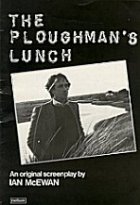
The Ploughman's Lunch Page #7
- R
- Year:
- 1983
- 107 min
- 365 Views
As Edward enters the other two applaud.
JEREMY:
How sweet.
Edward makes a nervous mock bow.
EDWARD:
Thank you. Have you two been
smoking that illegal stuff again?
James pours wine into Edward's glass.
JAMES:
We were admiring your poem in the
TLS, Edward.
EDWARD:
Ah, yes.
JEREMY:
It's terribly good.
EDWARD:
Don't tell me you've actually read
it, Jeremy.
James picks up the TLS and waves it at Edward.
JEREMY:
Committed to memory. Forever.
EDWARD:
I see.
JAMES:
Blasé and epicene.
JEREMY:
We were just chortling over that.
Blasé and epicene. It perfectly
describes the new Foreign Secretary.
So--I hope you don't mind, Edward,
I pinched it for my piece today.
EDWARD:
Attributed?
JEREMY:
Of course.
EDWARD:
Why, is there a new Foreign
Secretary? Who was the old one
anyway?
JEREMY:
It needn't concern you, Edward.
James has got some news. He needs
a poet's advice.
Jeremy pats a seat. Edward sits down.
JAMES:
C'mon. I don't want any Jones
about this.
JEREMY:
No jokes. James is in love.
EDWARD:
Congratulations. Who with?
JEREMY:
A glamorous young lady way above
his station...
JAMES:
Bastard.
JEREMY:
Name so Susie Barrington. Daughter
of the eminent historian, Anne
Barrington, step-daughter of the
scandalous Matthew Byrd the
acclaimed sack-artist...
Lay over Jeremy's account on next scene and FADE DOWN
SLOWLY.
INT. SUSAN'S FLAT - LATE EVENING
A sumptuously cluttered place. A chesterfield. Deep
armchairs, silk cushions, many prints, coffee table, books.
Clearly an inherited place.
Susan is pouring coffee. James sits across from her, jacket
off, sunk in cushions.
SUSAN:
Mummy and I, we were more like
lovers, really, or sisters. Then
a couple of years after Daddy died,
and not long after I left Oxford,
she started seeing various men and
I was furious. I really was upset.
I stopped going home. I never
phoned. I went round telling
everyone how awful her books were.
And she hardly seemed to notice,
and that made me angrier. Then I
got a job I was interested in, and
I started to see lots of men, and
I suppose I grew up a little and
began to understand. So I wrote
her a long letter, almost seven
pages, saying how sorry I was, and
how I was worried that we were
drifting apart. And do you know,
she wrote me a poem, a really
beautiful poem about mothers and
daughters.
JAMES:
How nice.
SUSAN:
It makes me weepy just to remember
it. So we were fine again, and
then she got married to Matthew
who's a womaniser and a bit of a
yob, but quite nice really, makes
TV commercials. What about yours.
JAMES:
Both dead.
SUSAN:
That must be rather nice, in a
way. I mean, you don't have any--
The door bell RINGS loudly.
SUSAN:
Damn. They're early.
JAMES:
Who?
SUSAN:
I called you a taxi.
JAMES:
Very thoughtful.
SUSAN:
(a gesture of
helplessness)
Well, you know...
EXT. FRONT DOOR - SUSAN'S FLAT - NIGHT
A minute later, James and Susan stand at the front door.
Portico and steps down to the street. Taxi waits. They
JAMES:
Again?
SUSAN:
Yes, if you like. Call me at work.
James descends the stairs. Susan closes the door.
INT. COCKTAIL BAR - EARLY EVENING
A cocktail bar, a self-conscious imitation of the American
model. James and Jeremy sit on high stools at the bar.
Translation
Translate and read this script in other languages:
Select another language:
- - Select -
- 简体中文 (Chinese - Simplified)
- 繁體中文 (Chinese - Traditional)
- Español (Spanish)
- Esperanto (Esperanto)
- 日本語 (Japanese)
- Português (Portuguese)
- Deutsch (German)
- العربية (Arabic)
- Français (French)
- Русский (Russian)
- ಕನ್ನಡ (Kannada)
- 한국어 (Korean)
- עברית (Hebrew)
- Gaeilge (Irish)
- Українська (Ukrainian)
- اردو (Urdu)
- Magyar (Hungarian)
- मानक हिन्दी (Hindi)
- Indonesia (Indonesian)
- Italiano (Italian)
- தமிழ் (Tamil)
- Türkçe (Turkish)
- తెలుగు (Telugu)
- ภาษาไทย (Thai)
- Tiếng Việt (Vietnamese)
- Čeština (Czech)
- Polski (Polish)
- Bahasa Indonesia (Indonesian)
- Românește (Romanian)
- Nederlands (Dutch)
- Ελληνικά (Greek)
- Latinum (Latin)
- Svenska (Swedish)
- Dansk (Danish)
- Suomi (Finnish)
- فارسی (Persian)
- ייִדיש (Yiddish)
- հայերեն (Armenian)
- Norsk (Norwegian)
- English (English)
Citation
Use the citation below to add this screenplay to your bibliography:
Style:MLAChicagoAPA
"The Ploughman's Lunch" Scripts.com. STANDS4 LLC, 2025. Web. 22 Jan. 2025. <https://www.scripts.com/script/the_ploughman's_lunch_500>.







Discuss this script with the community:
Report Comment
We're doing our best to make sure our content is useful, accurate and safe.
If by any chance you spot an inappropriate comment while navigating through our website please use this form to let us know, and we'll take care of it shortly.
Attachment
You need to be logged in to favorite.
Log In